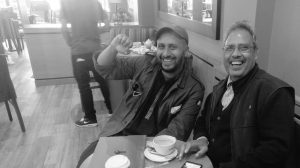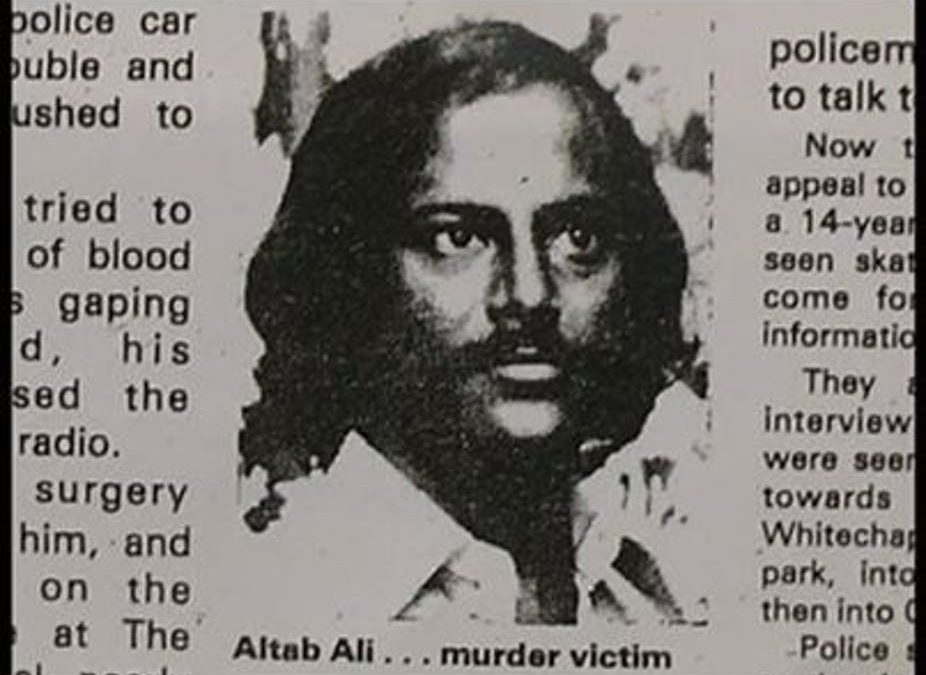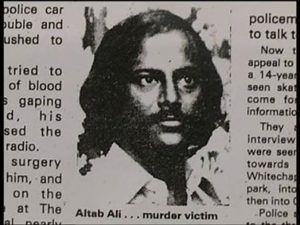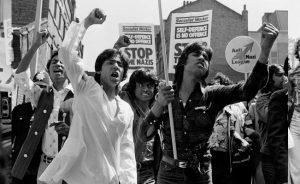The Summer of 1978
In popular culture the summer of 68, the student riots in Paris and the ancillary demonstrations around the world, are considered to this day as a cultural, social and moral turning point in the history of the post war modern world. In the East End of London, we also had a cultural, social and moral turning point, but for us it was not the summer of 1968 but the summer of 1978.
On the 4th May 1978, a young Bangladeshi textile worker, Altab Ali was murdered in east London. It was a racially motivated killing – not unique at the time – but one that acted as a catalyst which awoke a political movement and acted as a catalyst for lasting cultural and social change. In his way home, carrying shopping, walking through the then St. Mary’s Park (now Altab Ali Park).
Ten days after Mr Ali’s death, about 7,000 people marched behind his coffin through central London, through Hyde Park, Trafalgar Square and to Downing Street. The protestors chanted as they marched through the streets, ‘Black and White Unite and Fight’, calling on the government to address racism. Less than two months later, after another racist attack in Hackney, Ishaque Ali died of heart failure.
In response, anti-racism campaigners adopted new tactics. Groups of people would camp in the area overnight, in and around the National Front Headquarters in Eastern Street, denying racists the ground to operate and sell their literature. Though the process was gradual, far-right groups lost their influence in east London over the following decade and violent attacks became less frequent. In 1989 a gate was erected at the then St Mary’s Park, which in 1998 was renamed Altab Ali Park.
Above is a video explainer with regards to the murder of Altab Ali, and its significance 40 years on today.
An Unfinished Revolution – Rage Against the (Inequality) Machine
Alain Geismar—one of the leaders of the 1968 student demonstrations —”the movement succeeded as a social revolution, not as a political one.”
A lot of progress has happened since the dark days of the murder of Altab Ali. However there is a general feeling and frustration, that although access has increased that has not corresponded equally to political power and influence. There is a hidden anger, a ragem against the presumption of guilt a BAME person has to struggle against and held to higher standards, combating prejudices of harbouring dual loyalties, to causes of poverty being blamed on so called ‘backward culture’ rather than existing unequal economic/bureaucratic structures.
First, there is the rage in the Labour Party. As a local Labour Party, the Tower Hamlets Labour Party has come far, from the dark days in the 70s and early 80s when it was nigh impossible for a British Bangladeshi to join the party, but there is still a lot of work to be done. Many of us from a BAME background can attest to barriers we face, even today, from the recent struggle in the face of intense opposition, to bring back the rights of members to select their councillor candidates to the election of the first female BAME secretary in the local party’s history, Apsana Begum, the struggle continues (the local Party still continues to be in special measures).
Second, there is the rage in the street and on the estates. Outside in the Borough we have a situation where rising educational attainment in the BAME community, does not correspond to rising income, a joint effort is needed with stakeholders to address this situation. What the above situation signifies is that the invisible barrier of institutional racism needs to be tackled in order to reduce inequalities and poverty in the Borough.
Third, there is the rage in the Town Hall. Within the council there is the struggle to get recognition, that with the rise of the far right, protective categories of race and faith need to be reprioritized in the Boroughs Equality Assessment Plan. We need to acknowledge that certain policies have an disproportionately adverse impact on BAME communities, like the Council Tax Reduction Scheme for the Self Employed, adult social care charges. We also have the debate, of making the Town Hall a benchmark for other employers in the Borough in tackling institutional barriers to social mobility of the local BAME communities by reintroducing the policy of Workforce to Reflect the Community.
The meaning and significance of Altab Ali today
On Wednesday 11th of July in main Council Chamber I raised a question related to the memory of the murder of Altab Ali. I asked my friend, ward colleague and lead member for Environment, Cllr David Edgar, whether he would support the calls to change the name of the bus stop on Whitechapel Road, from Adler Street to Altab Ali Park. He answered in the affirmative.
The question was prompted by a request from Mohammod Rafique Ullah, a Labour Party member and one of the original organisers of the march in the wake of the murder of Altab Ali in 1978. For Rafique the changing of the bus stop signifies, that although the murder happened 40 years ago, preserving the memory is still poignant, as some of the political questions and demands in the wake of the murder still remain unfulfilled and unanswered.

With Rafique Ullah, 40 years on. Rafique was one of the key organiser in the protests following the murder of Altab Ali
“I’ll give ya a dose, but it can never come close,
To the rage built up inside of me!
Fist in the air, in the land of hypocrisy”
Wake Up! – Rage Against the Machine




Recent Comments